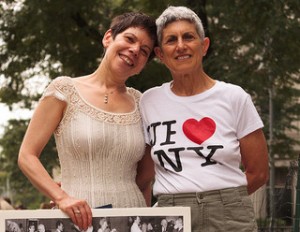There’s no freedom greater than my freedom from your religion
 In 1968, the year after the Supreme Court ended all bans on interracial marriage, 72 percent of Americans were still opposed to so-called “mixed marriages.” Richard Nixon ran for president campaigning on “states rights” and “law and order.” It worked. He was easily elected then re-elected in a landslide.
In 1968, the year after the Supreme Court ended all bans on interracial marriage, 72 percent of Americans were still opposed to so-called “mixed marriages.” Richard Nixon ran for president campaigning on “states rights” and “law and order.” It worked. He was easily elected then re-elected in a landslide.
Nixon blew the dog whistle but Ronald Reagan was a virtuoso who took the instrument to unimagined heights. He gave a speech at the beginning of his 1980 campaign for the presidency professing his belief in “states rights’ near Philadelphia, Mississippi where the local Klan had killed four civil rights workers in 1964. And his jabs at a particular Chicago “welfare queen” driving a Cadillac was barely veiled.
Nixon and Reagan’s strategies worked because the courts and the Congress had moved ahead of the American people to enact civil rights legislation. They were also effective because of their broad easily defensible appeal to “hard work” and “keeping what’s yours.”
In 2014, the law and the courts still lag behind public opinion same-sex marriage and LGBT rights, a debate which had more or less been frozen in carbon from 1993 – 2009 due to the “Don’t Ask, Don’t Tell” debacle. Even a majority of the people of Utah do not support bans on same-sex unions and Americans are shocked when they’re told that you can be fired for being gay in nearly three dozen states.
As settled as these debates are for millennials, who by nearly two-to-one margins hold marriage equality as a right as self-evident as the right to own the cell phone of your choice, the GOP base still is stuck in 1968 territory. Only a minority support same-sex marriage and the most motivated members of the party — just as with immigration reform — are the most opposed.
This frustration with a world that has changed around them is forcing Republicans to enact a new version of the “Southern Strategy.” Resolved that the courts are eventually going to legalize gay marriage in all 50 states, GOP reps have began pushing “religious freedom” legislation like SB 1062 in Arizona.
These laws suggest that for religious reasons people can object to serving gays and lesbians. This builds on a somewhat understandable sentiment: “When ‘leave us alone’ became ‘bake us a cake!’” asks The Daily Caller’s Matt Lewis. Even Andrew Sullivan — a pioneer of the same-sex marriage movement — buys into the right to not bake a cake for Christians.
But the real question is: When did religion become an excuse for laws protecting bigotry?
The anti-gay nature of bills that allow discrimination based on religion is obvious. There was no such legislation that followed the end of bans on interracial and interfaith marriages, though you can find scriptural justifications to both. Bakers don’t run out of the bakery screaming “FREEDOM!” when divorcees seek wedding cakes, though Jesus’ objection to divorce are perfectly clear unlike his imagined condemnations of homosexuality.
The bigotry behind these laws is painfully obvious. Instead of allowing Republicans adapting to an evolving world where people use Yelp to make sure they’re giving their business to people they think they’d like, the right is playing up imagined indignation for fictional bakers.
As John Fugelsang points out, gay people don’t want special rights. Religious people do.
I’m not sure if Republicans used to be better at utilizing their base’s anger at the other or our society is just becoming a place where otherness is embraced. But either way, these tactics don’t help the Republican Party. Eventually they may go far enough to inspire something really radical like young people showing up to vote in a non-presidential election year.
[Image Jose Antonio Navas | Flickr]



